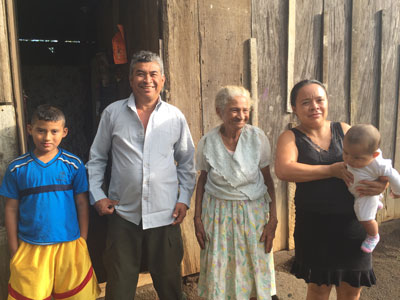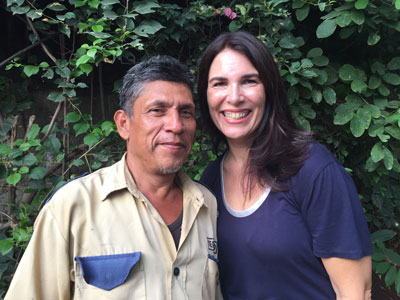A letter from Renée Sundberg serving in Nicaragua
October 2016
Write: Renée Sundberg
Write: Justin Sundberg
Individuals: Give online to E200391 for Justin and Renée Sundberg’s sending and support
Congregations: Give to D507579 for Justin and Renée Sundberg’s sending and support
Churches are asked to send donations through your congregation’s normal receiving site (this is usually your presbytery).
I’m much more limited than a few years ago. Relocating to another country gives rise to inherent limitations in language, available foods, activities and other conveniences. But the primary new limitation I encounter is fibromyalgia and its many components and complexities.
Limitations frustrate. We are taught to overcome them. When Justin and I accepted the invitation to serve as mission co-workers in Nicaragua, we certainly perceived possible obstacles as we disrupted our familiar and well-loved lives and careers in Seattle. But the vision was grand and we were accustomed to overcoming the roadblocks of life. But with fibromyalgia we have met a formidable challenge. The reality for me has been an ongoing struggle, with some good weeks and the tough ones, virtually insuperable.
So I’ve been contemplating limits. As I evaluate this season I am looking for the hidden gifts in limitations. How might being forced to slow down serve as a means to help me focus my purpose and labor? I work with Justin in our ministry at the rural development organization overseen by the Council of Protestant Churches (CEPAD). A big part of our partnership is me managing our home while he is away, sometimes for a month or more at a time. If I had fewer constraints I might be prone to stretch myself more thinly and thus have less to dedicate to our delicate work/domestic life balance.
I also believe my struggle with physical health builds a greater bridge of compassion and understanding with my brothers and sisters in Nicaragua. Part of being North American, for most of us, means having the resources to break through limitations, especially physical ones. But by being physically limited, I am beginning to appreciate what it may be to be limited in other ways: born into economic poverty, lack of things to get through the day easily—water, power, passable roads, no nearby school or medical facility. I hope to see my physical pain as something that reminds me of the value of learning from and standing alongside Nicaragua and her people.
Along the road to our home in Managua live Nicaraguans of modest means. Some have a bit more than others, allowing them to live in homes constructed from a type of cinder block. Others, like Carlos, reside in homes made from wood planks and found objects. Carlos has one of the most engaging smiles I have ever encountered. You can’t help but be filled by it. His face radiates joy. He works hard as an agricultural tenant, planting on land that isn’t his. Each year we have observed the status of his crops. Carlos, like so many farmers right now throughout Nicaragua, suffers from a kind of disorienting vertigo, not knowing what each day will bring. One of the effects of climate change in Nicaragua is the upsetting of the planting season. Formerly predictable weather patterns have given way to erratic spurts of dry weather and heavy downpours, both of which are unfriendly to farming.
Another familiar face to us is that of Ronald, one of the two guards who watch over our neighborhood. Ronald is rich in personality and his love for Jesus. His wife, at just 40, has had adult-onset diabetes for many years, ostensibly because of her poor diet. She cannot afford the food that she needs to replace the inexpensive staples that make her increasingly sick. Her remote location makes it difficult to get regular checkups and medical attention. Ronald trusts God for her care. He is happy to have full-time work, but he must travel two hours to get to and from his 24-hr shift as a security guard. His employer, our landlord, pays him under the table to avoid Social Security. He is not allowed to take sick time. Yet he has taught himself to read, after finishing just two years of formal education, only by reading the Bible! Ronald’s life is mostly a series of daunting limitations, yet his example spurs me to see mine differently.
Our mission partner, CEPAD, recognizes the many limitations confronting Nicaraguans living in rural places. CEPAD addresses these obstacles communally, knowing that when people work together to identify and address their most dire needs, change happens. The success of the communities is measured by the stories of individuals and families. Stories that chip away at obstacles and fuel hope for the future.
We all can identify the limitations in our lives. Are we willing to acknowledge the vulnerability we feel as a result of our struggles? Perhaps, even to see beauty in our finitude and the universal experience of being human? We are finite. We have limits. But a limit may be an invitation to experience not only solidarity with someone from another part of the globe, but the greatness of God. Jesus, in fact, calls those who do, “blessed.”
“You’re blessed when you’re at the end of your rope. With less of you there is more of God and God’s rule. You’re blessed when you feel you’ve lost what is most dear to you. Only then can you be embraced by the One most dear to you. You’re blessed when you’re content with just who you are—no more, no less. That’s the moment you find yourselves proud owners of everything that can’t be bought. You’re blessed when you’ve worked up a good appetite for God. God’s food and drink in the best meal you’ll ever eat” (Matthew 5:3-6, The Message).
As we approach the Advent season, may you rejoice that for our sake God chose the limitation of putting on flesh and dwelling in our neighborhood so that we might know God’s greatness and blessing in our lives.
Thank you for the gifts you have given us and the ministry of CEPAD through the encouragement and partnership that comes through the greetings you send. Through the prayers you offer. Through the sharing of financial support. We are co-laborers with you and look forward to your continued friendship in the New Year!
Renée and Justin Sundberg
P.S. Stay tuned for an exciting way you can impact the country of Nicaragua for decades to come: CEPAD’s “At the Center, Strong Communities” campaign.
![]() You may freely reuse and distribute this article in its entirety for non-commercial purposes in any medium. Please include author attribution, photography credits, and a link to the original article. This work is licensed under a Creative Commons Attribution-NonCommercial-NoDeratives 4.0 International License.
You may freely reuse and distribute this article in its entirety for non-commercial purposes in any medium. Please include author attribution, photography credits, and a link to the original article. This work is licensed under a Creative Commons Attribution-NonCommercial-NoDeratives 4.0 International License.

